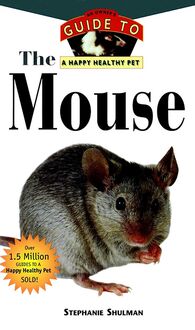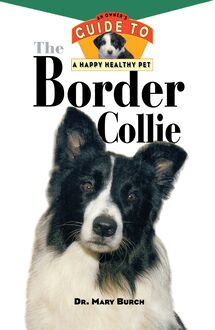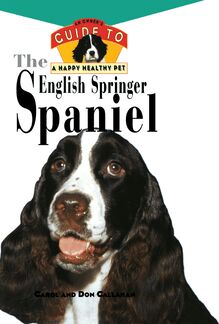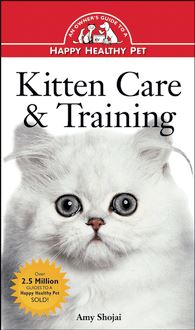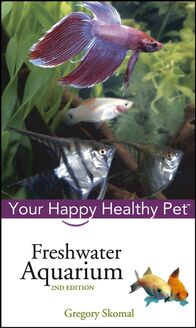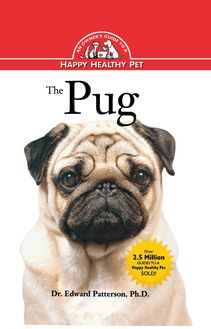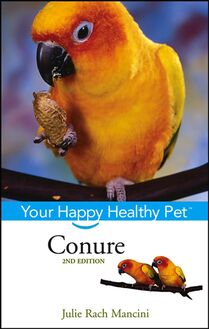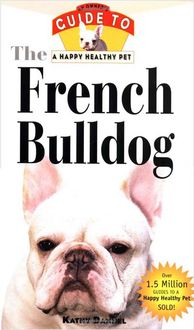The Brussels Griffon , livre ebook
124
pages
English
Ebooks
2007
Vous pourrez modifier la taille du texte de cet ouvrage
Obtenez un accès à la bibliothèque pour le consulter en ligne En savoir plus
Découvre YouScribe en t'inscrivant gratuitement
Découvre YouScribe en t'inscrivant gratuitement
124
pages
English
Ebooks
2007
Vous pourrez modifier la taille du texte de cet ouvrage
Obtenez un accès à la bibliothèque pour le consulter en ligne En savoir plus
Publié par
Date de parution
31 août 2007
Nombre de lectures
0
EAN13
9780470252666
Langue
English
Poids de l'ouvrage
4 Mo
PART ONE: Welcome to the World of the Brussels Griffon.
1. What Is a Brussels Griffon?
2. The Brussels Griffon's Ancestry.
3. The World According to the Brussels Griffon.
PART TWO: Living with a Brussels Griffon.
4. Bringing Your Brussels Griffon Home.
5. Feeding Your Brussels Griffon.
6. Grooming Your Brussels Griffon.
7. Keeping Your Brussels Griffon Healthy.
PART THREE: Enjoying Your Dog.
8. Basic Training (Ian Dunbar, Ph.D., MRCVS).
9. Getting Active with Your Dog (Bardi McLennan).
10. Your Dog and Your Family (Bardi McLennan).
11. Your Dog and Your Community (Bardi McLennan).
PART FOUR: Beyond the Basics.
12. Recommended Reading.
13. Resources.
Publié par
Date de parution
31 août 2007
Nombre de lectures
0
EAN13
9780470252666
Langue
English
Poids de l'ouvrage
4 Mo
The
Brussels Griffon
Howell Book House
Howell Book House
Macmillan General Reference
A Pearson Education Macmillan Company
1633 Broadway
New York, NY 10019-6785
Macmillan Publishing books may be purchased for business or sales promotional use.
For information, please write: Special Markets Department, Macmillan Publishing
USA, 1633 Broadway, New York, NY 10019-6785.
Copyright 1999 by Howell Book House
All rights reserved. No part of this book may be reproduced or transmitted in any form or by any means, electronic or mechanical, including photocopying, recording or by any information storage or retrieval system, without permission in writing from the Publisher.
MACMILLAN is a registered trademark of Macmillan, USA.
Library of Congress Cataloging-in-Publication Data
Vickers-Smith, Lorene.
The Brussels griffon / [Lorene Vickers-Smith].
p. cm. - (An Owner s guide to a happy healthy pet)
ISBN 1-58245-013-7
1. Brussels griffon. I. Title. II. Series.
SF429.B79V535 1999
636.76-dc21 99-22700
CIP
Manufactured in the United States of America
10 9 8 7 6 5 4 3 2 1
Series Director: Amanda Pisani
Editor: Seymour Weiss
Book Design: Michele Laseau
Cover Design: Iris Jeromnimon
Illustration: Laura Robbins
Photography:
Cover by Mary Bloom
Ashbey Photography: 7
Mary Bloom: i, 5, 8 bottom, 10, 11 top, 12, 13, 16, 18, 19, 20, 22, 23, 24, 26, 27, 28, 36-37, 38, 44, 45, 46, 47, 48, 49, 50, 52, 54, 55, 56, 57, 58, 60, 61, 62, 64, 65, 67, 69, 71, 72, 74, 75, 79, 94
Janell Copas: 30, 41, 53
Lorene Vickers-Smith: 1-2, 8 top, 11 bottom, 15, 17, 25, 29
From The Dog s Medical Dictionary, courtesy of Lorene Vickers-Smith: 14
Production Team: Tammy Ahrens, Carrie Allen, Clint Lahnen, Oliver Jackson, Dennis Sheehan, Terri Sheehan
Contents
part one
Welcome to the World of the Brussels Griffon
1 What Is a Brussels Griffon?
2 The Brussels Griffon s Ancestry
3 The World According to the Brussels Griffon
part two
Living with a Brussels Griffon
4 Bringing Your Brussels Griffon Home
5 Feeding Your Brussels Griffon
6 Grooming Your Brussels Griffon
7 Keeping Your Brussels Griffon Healthy
part three
Enjoying Your Dog
8 Basic Training
by Ian Dunbar, Ph.D., MRCVS
9 Getting Active with Your Dog
by Bardi McLennan
10 Your Dog and Your Family
by Bardi McLennan
11 Your Dog and Your Community
by Bardi McLennan
part four
Beyond the Basics
12 Recommended Reading
13 Resources
part one
External Features of the Brussels Griffon?
chapter 1
What Is a Brussels Griffon?
The dog has got more fun out of Man than Man has got out of the dog, for the clearly demonstrable reason that Man is the more laughable of the two animals.
-J AMES T HURBER
If the dog in Thurber s observation was a Brussels Griffon, however, the noted wit might have decided it was a toss-up. Griffons are spontaneous little outbursts of both surprise and joy. A Griffon can be depended upon to keep you on your toes, and will definitely keep you laughing.
In relation to a host of related breeds, the Brussels Griffon is a relative newcomer to the family of purebred dogs. As the name suggests, the Griffon was originally developed in Belgium, late in the nineteenth century from a combination of several other Toy dogs. It has been definitely established that the three primary breeds behind the Brussels Griffon (though there may have been more) were the Pug, the English Toy Spaniel and a small, rough coated, terrier-like, stable ratter, similar to the German Affenpinscher, which is a much older breed. From that varied ancestry, today s Brussels Griffon is a well-balanced, squarely-built, brachycephalic (flat-faced) Toy dog. It is vivacious, hardy, active and extremely intelligent. There are two coat varieties, rough and smooth, and four acceptable colors, solid red, solid black, black-and-tan and belge (a red ground color with a black or gray overlay on the body).
WHAT IS A BREED STANDARD?
A breed standard-a detailed description of an individual breed-is meant to portray the ideal specimen of that breed. This includes ideal structure, temperament, gait, type-all aspects of the dog. Because the standard describes an ideal specimen, it isn t based on any particular dog. It is a concept against which judges compare actual dogs and breeders strive to produce dogs. At a dog show, the dog that wins is the one that comes closest, in the judge s opinion, to the standard for its breed. Breed standards are written by the breed parent clubs, the national organizations formed to oversee the well-being of the breed. They are voted on and approved by the members of the parent clubs.
The term Griffon means thickly or roughly coated. To shorten the name, one would refer to the breed as a Griffon rather than a Brussels in the same sense that a German Shepherd Dog would be called a Shepherd and not a German.
The AKC Standard for the Brussels Griffon
In the following section, the actual text of the AKC Standard for the Brussels Griffon appears in italics. The author s commentary follows in roman type.
General Appearance A toy dog, intelligent, alert, sturdy, with a thickset, short body, a smart carriage and set-up, attracting attention by an almost human expression. There are two distinct types of coat: rough or smooth. Except for coat, there is no difference between the two.
This paragraph describes a small, alert, flat-faced dog that descended from a strong stable-ratter influence. He also can make a calm, loving lapdog. His large, very dark, knowing eyes and upturned pouty chin really do strike some people as being humanlike. Though his body is to be thickset, he should be small and compact.
From street urchin to show star-the author with her Westminster Best of Breed choice, Ch. Toobee s Rembrandt, owned by Dr. and Mrs. Harold Brooks.
Size, Proportion, Substance Size-Weight usually 8-10 pounds, and should not exceed 12 pounds. Type and quality are of greater importance than weight, and a smaller dog that is sturdy and well proportioned should not be penalized. Proportion -Square, as measured from point of shoulder to rearmost projection of upper thigh and from wither to ground. Substance -Thickset, compact with good balance. Well boned.
This body is thickset and compact, rather than slight bodied or terrier-type, set high on long legs.
Head A very important feature. An almost human expression. Eyes set well apart, very large, black, prominent, and well open. The eyelashes long and black. Eyelids edged with black. Ears small and set rather high on the head. May be shown cropped or natural. If natural they are carried semi-erect. Skull large and round, with a domed forehead. The stop deep. Nose very black, extremely short, its tip being set back deeply between the eyes so as to form a lay-back. The nostrils large. Disqualifications -Dudley or butterfly nose. Lips edged with black, not pendulous but well brought together, giving a clean finish to the mouth. Jaws must be undershot. The incisors of the lower jaw should protrude over the upper incisors. The lower jaw is prominent, rather broad with an upward sweep. Neither teeth nor tongue should show when the mouth is closed. A wry mouth is a serious fault.
A headstudy of a black smooth, showing beautiful breed type.
Disqualifications - Bite overshot. Hanging tongue.
The Standard s description of the head is very explicit and the most important feature of the Brussels Griffon. Breed type is either found or lacking in the Griffon s head. The face gives the impression of great width for the dog s size. The head is not so wide or flat in topskull as an envelope, such as is highly desirable in a Pekingese head, but neither should it ever seem long and narrow. The Griffon s head type closely resembles that of his English Toy Spaniel ancestors, and the domed forehead is viewed in profile. The skull between the ears is slightly rounded, from the front.
The muzzle and chin should be wide to balance the broad skull. The nosepad is broad and set in line with the large, well-open, round, dark, expressive eyes, and the tip of the nose is tilted into the forehead. The nostrils should be large and well open. In profile, the bottom jaw will protrude beyond the nosepad and curve upward so that the bottom lip will meet the short upper lip. This gives the Brussels Griffon a really unique expression, and whether human or monkey-like, it is both comical and intelligent to behold.
A lovely head portrait of a black rough.
The ears of the smooth type, if left uncropped, are soft and velvety. The ears on the rough variety will grow long hair and tufts, which must be removed if the Griffon is to be tidied up. The correct natural (uncropped) ear, which is becoming quite popular, should be small and will be lifted off the forehead before it breaks to fall forward.
Neck, Topline, Body Neck medium length, gracefully arched. Topline -Back level and short. Body -A thickset, short body. Brisket should be broad and deep, ribs well sprung. Short-coupled. Tail-set and held high, docked to about one-third.
THE AMERICAN KENNEL CLUB
Familiarly referred to as the AKC, the American Kennel Club is a nonprofit organization devoted to the advancement of purebred dogs. The AKC maintains a registry of recognized breeds and adopts and enforces rules for dog events including shows, obedience trials, field trials, hunting tests, lure coursing, herding, earthdog trials, agility and the Canine Good Citizen program. It is a club of clubs, established in 1884 and composed, today, of over 500 autonomous dog clubs throughout the United States. Each club is represented by a delegate; the delegates make up the legislative body of the AKC, voting on rules and electing directors. The American Kennel Club maintains the Stud Book, the record of every dog ever registered with the AKC, and publishes a variety of materials on purebred dogs, including a monthly


